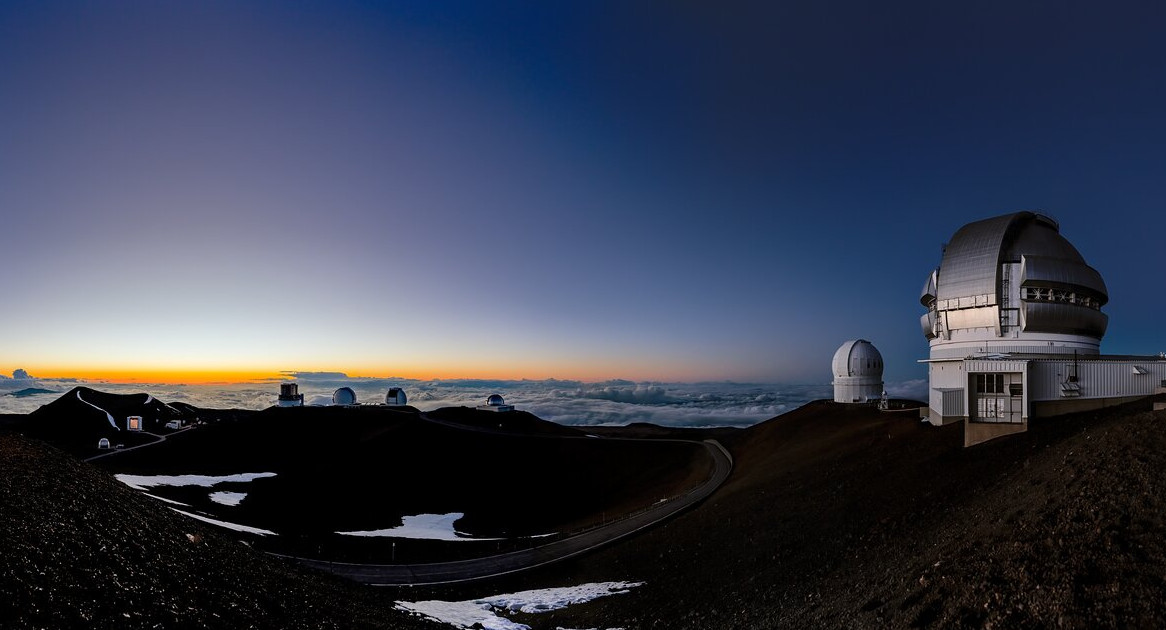(BIVN) – On Thursday, Governor David Ige signed HB2024 – the bill establishing a new Mauna Kea Stewardship and Oversight Authority – into law as Act 255.
Governor David Ige said during a June news conference that he did not plan to veto HB 2024, which was passed by the Hawaiʻi State Legislature during the 2022 session. Act 255 will transition the responsibility of managing the summit area of Maunakea from the University of Hawaiʻi to a new Authority.
Today, various Maunakea observatories (like the East Asian Observatory, Keck, and others) issued statements on the new law, mostly presenting an optimistic view of the situation.
“The Canada-France-Hawaiʻi Telescope thanks the Hawaiʻi State Legislature, the Mauna Kea Working Group, and the many passionate community members for their hard work and sincere effort to identify structure for the future of Maunakea governance where astronomy can thrive alongside the other interests of our local community here on Hawaiʻi Island,” said Dr. Andy Sheinis, Interim Director of the CFHT. “We are grateful to the University of Hawaiʻi for their long and continued partnership with our observatory, and for the tremendous work done every day by the men and women of the UH Center for Maunakea Stewardship. CFHT is encouraged that the final version of House Bill 2024 codifies astronomy as a policy of the state of Hawaiʻi. Our observatory shares the commitment by the University of Hawaiʻi and the other Maunakea Observatories to support the new Mauna Kea Stewardship and Oversight Authority as it is established, and we look forward to working collaboratively with the authority into the future.”
AURa, the Association of Universities for Research in Astronomy, and the National Science Foundation’s NOIRLab referenced this set of principles for the future management of astronomical facilities:
At its April 28, 2022 meeting the AURA Board of Directors endorsed the following principles for the future management of astronomical facilities on Maunakea. The principles are the consensus of the Directors of W.M. Keck Observatory, Subaru Telescope, and Gemini Observatory. The opinions reflect the position of the individual directors of these three observatories and does not necessarily represent the official position of the observatories’ boards of directors or their funding organizations.
[1] We recognize and are grateful for the privilege of operating astronomical telescopes on Maunakea.
[2] We recognize that Maunakea is an indigenous space, and that Native Hawaiian people have profound relationships to the Mauna. We support Native Hawaiian involvement in any future Maunakea governance in a respectful, meaningful, and significant way; we believe this is essential to the long-term viability of astronomy on Maunakea. We must maintain a community connection, one that is long-term, recognized, and conveys trust and respect.
[3] We acknowledge the importance of supporting the responsible management of the environmental and cultural resources of Maunakea.
[4] Undertaking frontier, world-class observational astrophysics can be independent of, and detached from, whatever entity is responsible for the management of the science reserve which encompasses the major observatories. We are willing to work with any managing organization that is supportive of a future for astronomy on Maunakea.
[5] We seek a stable, long-term sub-lease for scientifically productive telescopes, to allow for effective long-range planning with our partners, funders, instrument builders, staff, and astronomy community. We understand that there are costs to decommissioning our facilities at the end of their useful life or when the lease ends.
[6] We need a viable, sustainable financial model for sharing the costs of administering the site.
[6a] The operation of world-class observatories requires essential services, such as power, networks, water, and transportation infrastructure support to be provided, on a cost reimbursement basis, to the facilities, including respectful but unfettered access to these complex facilities by authorized observatory staff.
[6b] The environment at Maunakea must be protected, including dark skies on the island, and the minimization of light, radio interference, dust pollution, and water pollution at the site.
[6c] Any telescope time contribution must be recognized as a real expense of the observatories when calculating other financial support that they will provide for the privilege of operating on Maunakea.
[7] We seek an astronomy voice (not control) in the executive deliberations of any governance arrangement. Due to the complexity of interfaces, the consequential costs, and the multitude of overlapping interests in operating major observatories, Observatory leaders must have meaningful representation and influence with the entity charged with managing the Maunakea science reserve.
A spokesperson for the Maunakea Observatories said “those who have not issued statements have internal policies that preclude them from commenting on legislative action.”


by Big Island Video News12:39 pm
on at
STORY SUMMARY
MAUNAKEA, Hawaiʻi - Several observatories struck a positive tone in response to the signing of House Bill 2024 into law.